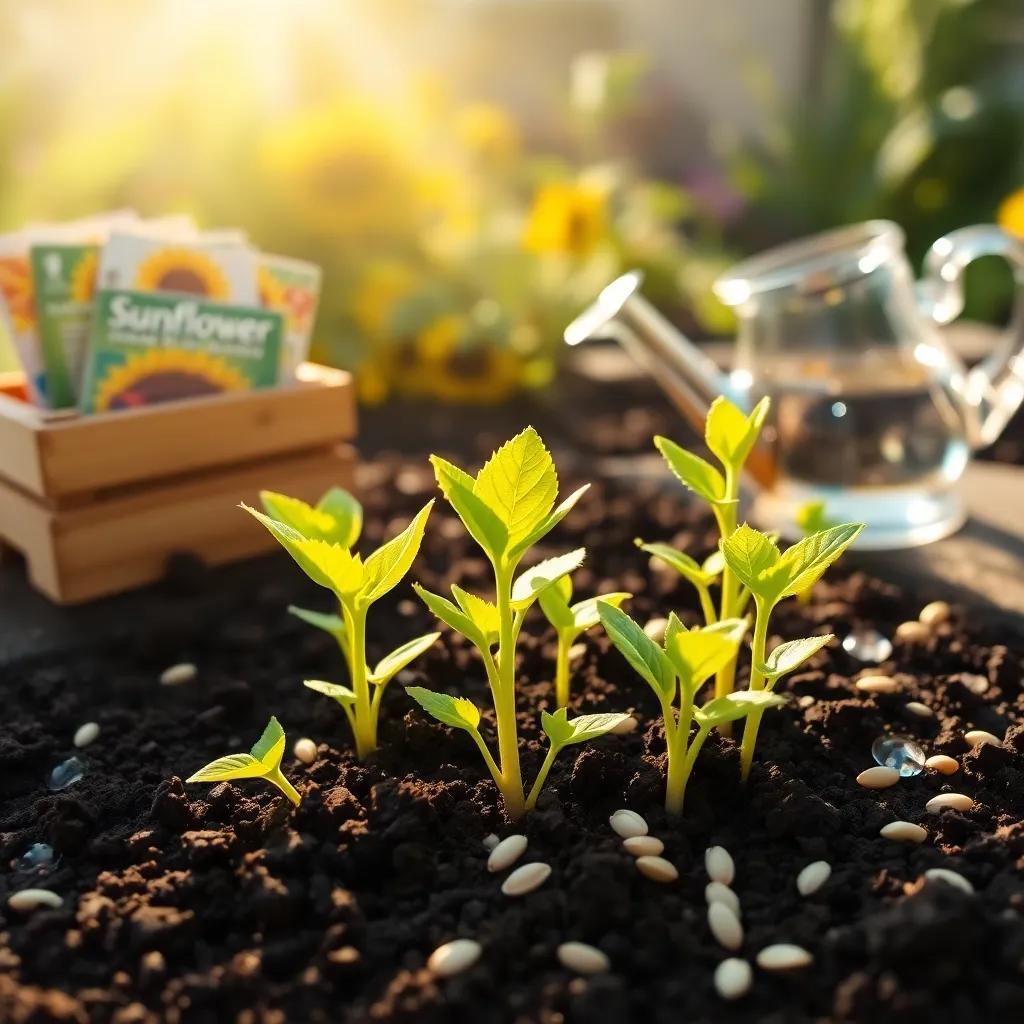Are you ready to fill your garden with bright, cheerful sunflowers? 🌻 In this guide, I’ll share everything you need to know about growing sunflowers from seeds, including the best tips to help them sprout and thrive! Whether you’re a seasoned gardener or just starting out, these friendly insights will make your sunflower journey a fun and successful adventure! Let’s get those seeds ready to bloom!
Factors Affecting Sunflower Seed Germination
Growing sunflowers from seeds is like planting a little piece of sunshine in your garden! 🌻 However, not all seeds sprout just like that. Several factors can influence how quickly and successfully sunflower seeds germinate. Let’s look at what can help or hinder your little seeds on their journey to become tall, vibrant plants.
- Temperature: Sunflowers love warmth! They thrive best when the soil temperature is between 70°F and 85°F (21°C to 29°C). If the soil is too cold, your seeds might just sit there, twiddling their imaginary thumbs! A little warmth goes a long way in getting those seeds moving!
- Moisture: Just like us, seeds need a drink! Keeping the soil damp is essential, but be careful not to drown them. Overwatering can lead to soggy seeds, which is no good. Aim for consistently moist soil; not too dry, and definitely not waterlogged!
- Soil Conditions: Sunflowers like well-draining soil with a pH of 6.0 to 7.5. Poor soil can suffocate the seeds and keep them from growing. Adding organic matter can improve soil quality, making it a cozy home for your seeds.
- Seed Quality: Fresh seeds are like fresh ingredients in a recipe. The better the quality, the higher the chance of successful germination! Always check that your seeds are from a reputable source.
- Light: Sunflower seeds don’t need light to germinate, but they will appreciate it once they sprout. After the seeds push through the soil, giving them plenty of sunlight will help them grow tall and strong!
By understanding these factors, you can create the perfect environment for your sunflower seeds to sprout and grow. Happy gardening!
Germination Timeline: What to Expect
Alright, let’s talk about the germination timeline! If you’re anything like me, you’re probably excited to see those sunflower seeds sprout! 🌱 Generally, sunflower seeds take about 7 to 14 days to germinate, but don’t worry if things seem to be taking their sweet time. Here’s a quick breakdown of what happens during those days:
- Days 1-3: Absorption Stage
During the first few days, seeds soak up moisture from the soil. They swell, puff up, and get ready for action! It’s like they’re getting their morning coffee before starting their day!
- Days 3-7: Radicle Emergence
Next, the radicle, or the baby root, breaks through the seed! This is super important because the radicle anchors the seedling and starts drinking up all that delicious water and nutrients.
- Days 7-10: Cotyledon Emergence
Around this time, you’ll see the cotyledons, or seed leaves, popping up from the soil. These leaves are the seedling’s first meal, helping it get energy until true leaves appear.
- Days 10-14: True Leaf Development
Finally, the seedlings start growing their true leaves. These leaves are different from the cotyledons, and they mark the transition into young sunflower plants!
So, there you have it! The timeline can vary depending on temperature, moisture, and seed quality, but with patience and care, you’ll soon have a garden full of beautiful sunflowers. Happy planting! 🌼

Tips to Accelerate Sunflower Seed Sprouting
If you’re as excited as I am to see sunflowers burst forth from the ground, you’ll want to know how to give those little seeds a quick start! 🌱 Here are some tips to help speed up sunflower seed sprouting and get you on your way to a cheerful garden in no time!
- Pre-soaking the Seeds: Before you plant, try soaking your sunflower seeds in water for about 24 hours. This little bath softens their hard seed coats, making it easier for them to sprout. It’s like a refreshing spa day!
- Warm Soil: Sunflowers love the heat. Keeping the soil temperature between 70°F and 85°F (21°C to 29°C) will help them germinate faster. If it’s chilly outside, consider using a heating mat or placing a clear plastic cover over the planting area to trap warmth.
- Consistent Moisture: Water your seeds regularly, keeping the soil moist but not soggy. A spray bottle works wonders here! Too much water can make the seeds rot, which is a definite no-no.
- Proper Planting Depth: Plant your seeds about 1 to 1.5 inches deep. If they’re too shallow, they might dry out; too deep, and they’ll struggle to reach the surface!
- Good Spacing: Give your seeds some room! Crowding can slow down germination. Aim for about 6 inches apart to let them spread their leaves and soak up that sun.
By using these tips, I’ve found that my sunflower sprouting game gets a boost! It’s all about creating a cozy little environment for those seeds to thrive in. Soon enough, you’ll be greeted with bright yellow blossoms that bring joy to your garden. 🌻
Common Issues and Solutions During Germination
As we dive into the world of growing sunflowers, it’s important to know that challenges can arise. But don’t worry! I’ve got some handy tips to help troubleshoot common problems you might encounter during the germination phase. Let’s keep those seeds happy and healthy!
- Poor Germination Rates: If you notice that not many seeds are sprouting, it could be the quality of the seeds or unfavorable conditions. Try doing a seed germination test before planting to check which seeds are viable. Make sure you’re meeting the temperature and moisture requirements too!
- Seed Rot: Excess moisture can cause your seeds to rot, which is a major bummer! Make sure your soil drains well, and don’t go overboard with watering. If you see any mushy seeds, remove them immediately to prevent the spread of any bad stuff.
- Damping-Off Disease: This nasty fungus likes damp conditions and can make your seedlings wilt. To prevent it, make sure there’s good air circulation around your seedlings. Avoid overwatering and use a sterile potting mix to reduce the risk.
- Pest Problems: Watch out for sneaky pests like slugs and birds! They may munch on your seeds or seedlings. Using natural pest control methods, like introducing beneficial insects or setting up barriers, can help keep your garden safe.
- Weed Competition: Weeds can be party crashers in your garden! They compete for nutrients and sunlight with your sunflower seedlings. Regularly check and remove weeds to give your sunflowers the spotlight they deserve.
By being aware of these common issues and how to tackle them, I feel more confident that your sunflower seeds will sprout successfully. A little attention goes a long way in nurturing those vibrant plants! 🌼
Best Practices for Healthy Sunflower Growth
Now that we have our sunflower seeds sprouting, let’s talk about some best practices to promote healthy growth. I want my garden to thrive, and I bet you do too! Here are some friendly tips to keep your sunflowers happy and growing tall.
- Sunlight, Sunlight, Sunlight: Sunflowers are like sun worshippers! They thrive in full sunlight, so make sure they receive at least 6 to 8 hours of bright, direct light each day. Consider planting them in an area with good sunlight exposure.
- Regular Watering: Keep that soil consistently moist, especially during dry spells. Sunflowers need about 1 inch of water per week. I like to check the soil moisture by sticking my finger about an inch deep. If it feels dry, it’s time for a drink!
- Fertilizing: Sunflowers love a bit of food too! Using a balanced, slow-release fertilizer can provide the nutrients they need to grow strong. Just follow the package instructions, so you don’t overdo it. A little can go a long way!
- Staking Tall Varieties: If you’re growing tall sunflower varieties, consider staking them for support. A gentle wind can turn those beauties into awkward leaners! Providing a stake can help them stand tall and proud.
- Regular Monitoring: Keep an eye on your sunflower plants. Look out for any signs of pests or diseases—easy early detection can save the day! Regular checks will also allow you to adjust care as needed.
With these best practices, I believe your sunflowers will flourish, turning your garden into a stunning display of golden blooms. Let’s keep nurturing those little beauties, and soon they’ll be swaying in the breeze, making us all smile! 🌻

